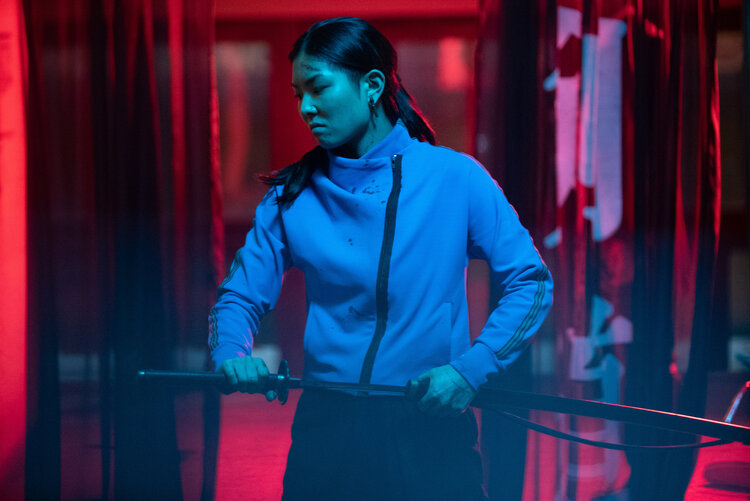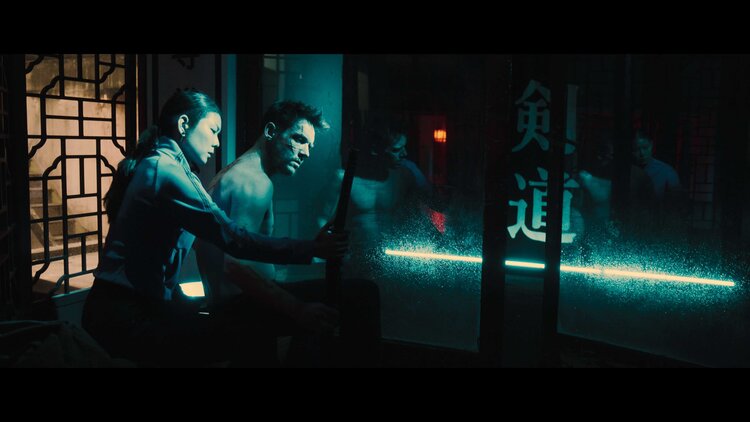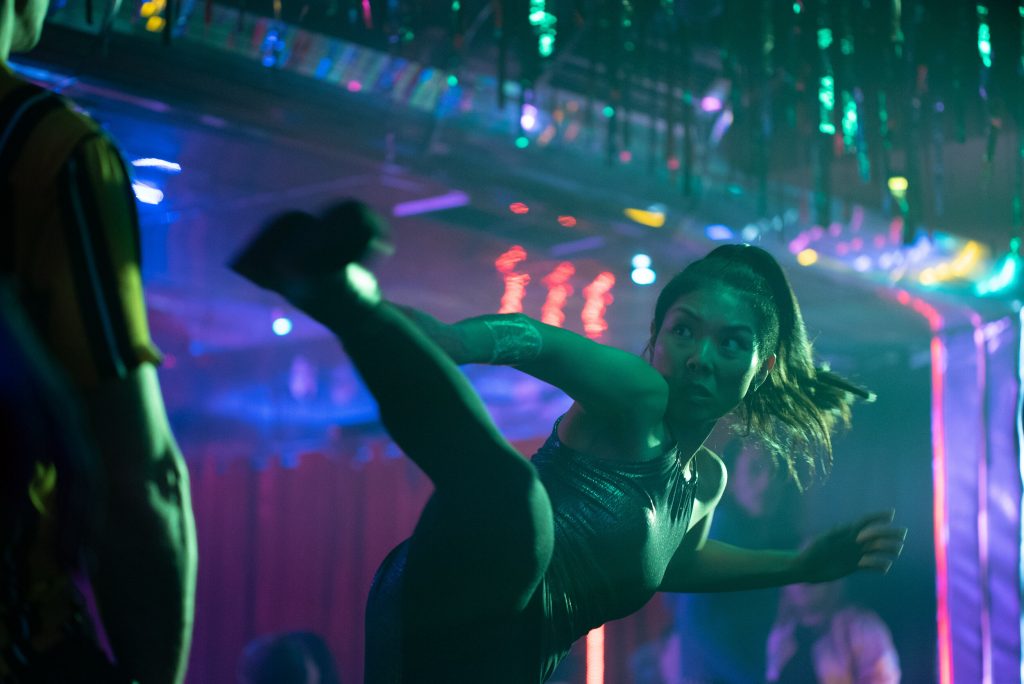
Synopsis : Set in the expansive Japanese community of Sao Paulo in Brazil — the largest Japanese diaspora in the world — YAKUZA PRINCESS follows Akemi (MASUMI), an orphan who discovers she is the heiress to half of the Yakuza crime syndicate. Forging an uneasy alliance with an amnesiac stranger (Jonathan Rhys Meyers) who believes an ancient sword binds their two fates, Akemi must unleash war against the other half of the syndicate who wants her dead.

An Exclusive Interview with Actress Masumi
Q: Konichiwa. Where were you born?
M: I was born in Palos Verdes, California, where there were a lot of Japanese people at the time. Then I moved to Japan when I was three or five years old, around that time — and was basically raised in Japan from that point on.
Q: Until when?
M: I went to junior high and a little bit of high school in Japan, and then I spent most of my high school in Texas. I re-learned my English again at a Texas high school. Then I came back to attend university in Japan; I enrolled in ICU [International Christian University]. After the earthquake in 2011, I came back to the U.S.
Q: You established your career as a singer-songwriter. How did you get cast in this film? Did you audition or director saw you on YouTube or something? What was the audition process like?
M: When I was in an acting school, in a class, my husband called and told me that there was some kind of opportunity for me, so I rushed home. My husband’s manager was at a meeting with the producer of Yakuza Princess, and at the time he had my show reel for another audition. He showed it and said, “I wonder if you’d like this girl.” The producer really liked it and wanted to have a meeting with me immediately. So we had a meeting two days after the call, and I did the audition for Yakuza Princess.
Q: That’s surprising because this is your first time in a major role, yet you didn’t try out at any auditions in the past.
M: I never really thought about being an actress before. I approached a management company that’s big in Japan — it also has a branch in America — they’re very well known for their music management. So I went there because I wanted them to manage me as a musician and they actually asked me to go for a theatrical audition. I told them I didn’t have any experience but I did it anyway, and it went very well.
They signed me as a commercial talent, so I ended up doing a lot of commercial auditions. But eventually, I felt like I was taking too much time away from my music and I never wanted to be an actress. So I left that the management company and focused on my music again.
Q: In this film, you’re required to do so much training in martial arts, kendo, and sword fighting. How did you collaborate with the choreographer and train for it all?
M: Yeah, there was a lot of kendo, and the sword fighting and there were also a lot of stunts, plus the martial arts part as well. I didn’t have either stunt or martial art experience before. I was very lucky that my husband, Kenny Leu, is a martial artist, and he was able to help me through the process. I would rehearse with my fight choreographer during the day and then I’d come home and practice with my husband in the gym at our apartment. For about a month, we did that really intense training. During the shoot, everybody helped me with the sword, especially because I didn’t have enough training on that. So that’s how I got through it.
Q: Did you get familiar with the katana sword, a Muramasa and all those things? How much did you actually get into the Japanese cultural aspect? Even though you grew up in Japan, you were away for about a decade or so.
M: My father was born in the year that World War II ended so he knew a lot of stories. My grandfather was in a samurai school and did kendo and sword fighting as well. So my dad knew a lot about that. We talked about it and I had a little bit of knowledge about it.
I also had difficulty dealing with the sword because I’m scared of knives in general — and I’m scared of forks, butter knives; I have a lot of fear around that. So I had to get over that fear in order to have a relationship with the sword. That’s what I focused on the most, actually, was sword fighting.
Q: How familiar were you with the graphic novel which this film is based on, “Samurai Shiro?” Did you read it?
M: Yeah, I read the comic, the whole thing. I met the writer and creator of the comic Danilo Beyruth, and really liked it.

Q: In this movie you worked with Jonathan Rhys Meyers and Tsuyoshi Ihara who have lots of acting experience. Did they give you any acting tips on set?
M: I got a lot of help on the sword from Ihara-san. He has a lot of experience in that. He was very generous, always helping me. He was like a big brother to me, so warm and open.
I got to act opposite Jonathan a little bit more because I had more scenes with him. He was my really my co-partner in the movie. He gave me a lot of tips on how to move with the camera, and acting tips. When I met Jonathan I told him, “Hey, I don’t have any acting experience. This is my first time on a set, acting in front of a camera, I’ve never acted before.” Jonathan said, “Masumi, do not worry, because I’m going to support you all the way. I’m not going to let you be embarrassed with anything that you do. I’m going to support you. We’re going to do this together.” He really walked me through our scenes together.
Q: The film seems to be recreating a Japanese atmosphere. Is there a Japanese community in São Paulo that looks like the film, or were they just recreating a community from Japan?
M: São Paulo has an area called Liberdade, which is the largest Japanese community outside of Japan. So there are a lot of Japanese and Japanese Brazilians there. Some of the urban streets look like Japan, really. There are some streets where we created it with life and the neon lights and things like that. There are so many Japanese people there, it feels like you’re back in Japan a little bit. Of course the buildings and everything are different. That’s the interesting part of it: having a Japanese city in São Paulo.
Q: Can you talk about working with director Vicente Amorim? He previously made a yakuza movie, Dirty Hearts. Is he familiar with Japanese culture? This is your first big role so did you collaborate with him?
M: Vicente knows a lot about Japanese culture because he really is interested in it. He knows a lot about it. He made Dirty Hearts — I studied that movie as well — because of the intensive knowledge he has about Japanese culture and traditions. He loves those movies. Working with Vicente – we communicated a lot, he was always there to listen to my ideas.
Q: Right now, there are not many Asian action actors in the film industry. You have a pretty good chance getting into an action film. Do you want to pursue acting as well? What’s vision of your future?
M: I want to do it all! I want to do music and acting. Right now I’m focused a bit more on acting, because there are more opportunities coming in and have to put music a little bit to the side. But I’m never going to stop singing, that’s my soul, that’s my heart, singing is.
Q: Do you have any favorite directors or actors that you want to work with?
M: I love Kaori Momoi. She was always my hero growing up. I watched her acting a lot. I’ve always loved her. She’s now in Los Angeles. It would be great if I could work with her.

Q: Have you ever met her?
M: I actually met her at a party once. But then I was a musician and hadn’t acted yet.
Q: Do you have another film coming up now?
M: It’s a little up in the air right now, but hopefully it will be decided soon.
Q: This film is showing at the Fantasia Film Festival. What kind of reaction are you all getting for this film? Since this is a very difficult time, is there an in-person screening?
M: I think maybe it was both, but we are on the virtual ones.
Q: Sometimes when one sees a film that tackles Asian subject matter, such as the culture, the American depiction of Japanese culture is very different from what we know from a Japanese perspective. Do you see that sometimes in the United States? Do you want to make a difference?
M: Yeah, absolutely. One of the things I realize is that the auditions I get are for a Japanese character but then I’d see a person being cast that’s usually half-Japanese and can’t really speak the language. But they’re saying Japanese lines and the theme, right? I never had to get this kind of feeling because I grew up in Japan and never had to feel like I had to represent Japanese people being in Japan.
Being in America, and in this entertainment business, seeing your language being spoken in a way THAT you can barely understand the Japanese. But that person’s supposed to be Japanese yet she’s half and can’t really speak Japanese. That hurts me a bit because I want to see more of my language or Japanese people representing Japan correctly. I want to see myself in movies and see other Japanese people who are really Japanese have the same opportunities as the Westerners and mixed people. We just want the same opportunity. That’s what I’m looking for.
Q: Do you want to pursue Japanese drama and work in a Japanese film? Rather than just work in the U.S., you could also work in Japan as well.
M: I would love to work in Japanese film. I would love to do all kinds of stuff. One day I hope to go back to Japan and work. [I’m] sure that will happen.
Q: After this film, what things do you want to change about the Asian community in the movie industry?
M: What I’m focused on is that I want Japanese people to be seen for who they are. There are so many talented singers and actors in Japan that are not getting the spotlight and I want to change that. I want more Japanese people to be in movies and as leads.
Here’s the trailer of the film.

